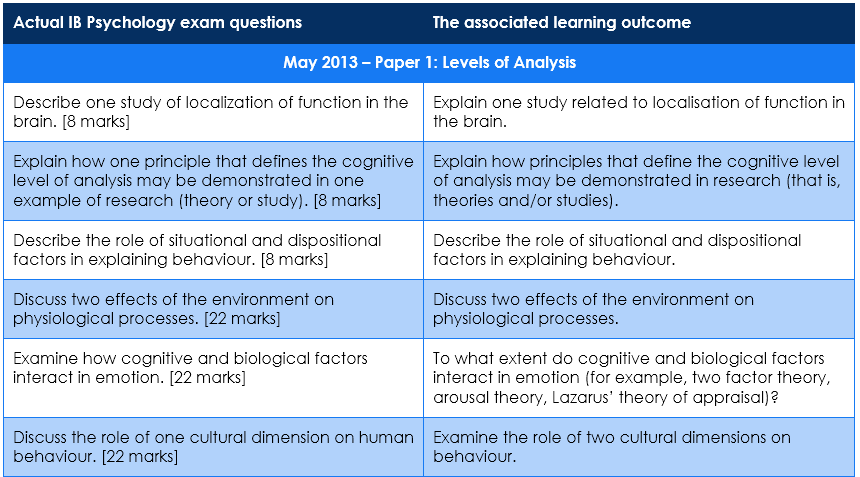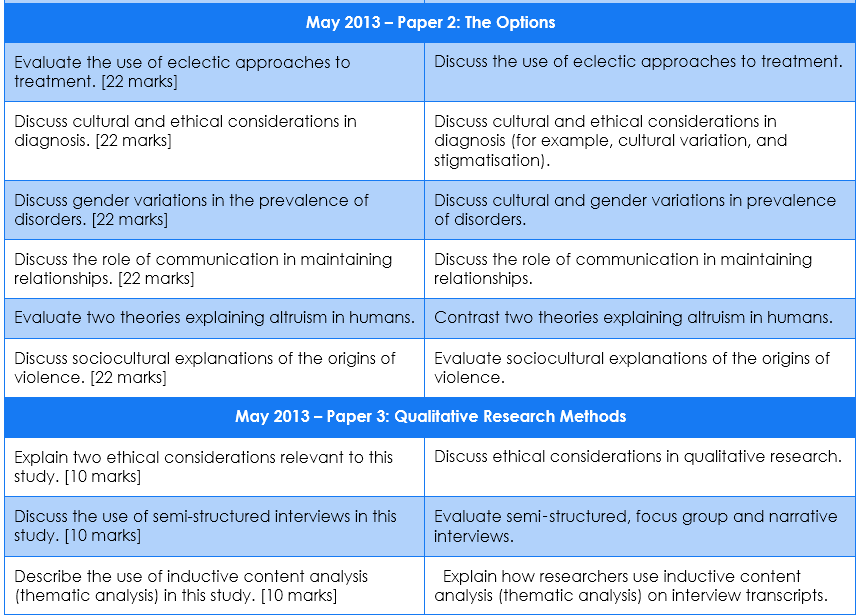| The insider's guide to achieving the elusive 7 in IB Psychology. Less than four percent of IB Psychology higher level students will be awarded a grade of 7. In fact, only 3.75% of HL Psychology students in the May 2013 examinations were awarded that highest maximum possible mark. Never fear, IB Psychology is here to help. Achieving the IB Psychology 7 is not exactly rocket science. A little known fact that teachers either don't know or don't choose to share with their students is that you know exactly how questions will be asked in the IB Psychology examinations in each and every paper - Paper 1, Paper 2 and Paper 3. You can prepare perfect models answers: 8/8 for the three short answer questions ), and 22/22 for the extended response questions (ERQs). Practice these answers until you can reproduce them in exam conditions and you will find yourself walking into those exams with a head full of answers you can replicate across any of the questions being asked. "You already know the questions for the IB examinations!", I hear you gasp. Yes, we know exactly which questions can be asked. We just don't know which of the possible selection will actually turn up in the exam on the day. No other IB subject affords students and teachers this luxury ... shhhh! It's our little secret. | IB Psychology: We love you Number 7! |
The IB Psychology Exam Questions are the Learning Outcomes
| The IB Psychology Guide has all of the exam questions listed, topic by topic. The IB Psychology Guide (the official IBO guide to the IB Psychology syllabus) lists all of the Learning Outcomes associated with each section of the course – the Levels of Analysis and the Options (and even the HL Qualitative Research Methodologies. These learning outcomes guide us as teachers as to what we need to be teaching our students. And, if you don’t for some reason or another, trust your IB Psychology teacher then you can monitor what should be being taught in the IB Psychology classroom. What is great about the IB Psychology course is that the learning outcomes match the examination questions. For example, you are required in the Biological Level of Analysis to learn – With reference to relevant research studies, to what extent does genetic inheritance influence behaviour? The November 2012 IB Psychology exam had the extended response question (i.e., the big 22 mark question that requires answering) – With reference to psychological research (theories and/or studies), to what extent does genetic inheritance influence behaviour? [22 marks]. We hope that you can see the pattern! | IB Psychology exam questions closely match the learning outcomes in the course, so closely that they more often than not, appear word-for-word in the examinations. If not word-for-word, then they are very, very close matches. For example, again in the November 2012 examination the short answer question (8 marks) is asked at the Cognitive Level of Analysis: Explain how one biological factor may affect one cognitive process. [8 marks]. The corresponding learning outcome is: Explain how biological factors may affect one cognitive process (for example, Alzheimer’s disease, brain damage, sleep deprivation). The clear links between the IB Psychology learning outcomes and the examination questions also applies to the Options. In May 2013 the learning outcome: Discuss the use of eclectic approaches to treatment, was slightly tweaked with the command term being changed to ‘Evaluate’: Evaluate the use of eclectic approaches to treatment. Clearly the strengths and limitations of an eclectic approach to treatment would be covered in a ‘Discuss’ learning outcome. Do you need more convincing? Higher Level Paper 3, May 2013 again. The examination question: Explain two ethical considerations relevant to this study. [10 marks], is taken directly from the learning outcome, Discuss ethical considerations in qualitative research. You can prepare and memorise perfect model answers to the learning outcomes and then regurgitate them in exams. This is the Secret of the 7: Prepare and memorise model answers to the learning outcomes AND produce a great IA. To further illustrate this point. The May 2013 IB Psychology examination questions – Papers 1, 2 and 3 – are listed below. Next to these are their associated learning outcomes. Judge for yourself the closeness of the match and how beneficial it would have been to have walked into these exams with answers prepared and memorised for the learning outcomes. We could have prepared tables for all of the IB Psychology examinations to further support this point, but we do have classes to teach and lesson to prepare! All of the IB examination questions from the May 2013 exams are stated below. Next to them are the learning outcomes. |




 RSS Feed
RSS Feed